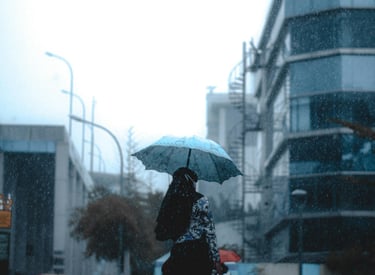How to Check if a Country is Safe Before Travelling
Traveling to new countries can be an exciting adventure, but ensuring your safety is paramount. Here’s a guide on how to assess a country’s safety before your trip.
The Traveled For You Team
10/4/20247 min read


How to Check if a Country is Safe Before Traveling
Visiting a new country can be a thrilling experience, as one gets exposed to the aspects of culture, geography, and traditions different from their own. Nevertheless, before traveling to any place, it is always necessary to give priority to safety. Every destination presents certain risks not present elsewhere, whether from political unrest, natural disasters, or even health concerns. Proper research and good planning will ensure that you are fully informed of all aspects of your destination and confident in its safety. This guide provides a look into a few strategies and resources one could apply to evaluate country safety before travel.
1. Consult Official Travel Advisories
Safety can be assessed by consulting official government travel advisories-the warnings governments issue to their own citizens regarding dangers in other regions. Each country maintains its own advisory system, and here are some key sources:
US Department of State-Travel Advisories: The US government issues a travel warning for each country on a four-level system from 1, being the safest to 4, "Do Not Travel". It grades countries based on crime, terrorism, natural disasters, and health concerns. It also gives some idea of specific regions to be wary of.
UK Foreign Travel Advice: For British nationals, the UK Foreign, Commonwealth & Development Office has foreign travel advice. Many ways, it parallels the U.S. version by explaining specific risks and giving advice based on regions of the country.
Australian Department of Foreign Affairs and Trade: For Australians, DFAT issues travel advisories that grade the safety of foreign countries and contain information relative to health and legal risks.
Canadian Travel Advisory: Similarly, Canada's Global Affairs office gives advice on potential security issues, natural disasters, and health-related warnings for each country.
Comparing the several advisories gives a wider overview and allows the comparison of the level of risk assessments from different governments.
2. Research Local News and Reports
While official advisories serve as a good starting point, research through local news reports will give one a detailed understanding of the events ongoing within the country. This may further be used to flesh out information received regarding on-ground activities. As a matter of fact, local media may report incidents that international news agencies may miss out, such as protests, strikes, or increasing crime rates.
Key steps:
It would also be good to check some popular news websites or newspapers, especially local ones.
If the language is unknown, using some online translation tools will be helpful.
Sign up for some travel forums where locals or expats update daily conditions.
Knowing about local issues-sketchy strikes, sudden political instability, or simply smaller-scale travel disruptions-can better help you plan your trip.
3. Check Reliable Travel Forums
Travel forums and websites, such as TripAdvisor, Reddit, and Lonely Planet, are very good sources for current information directly from travelers who have recently been to your destination. These forums offer firsthand accounts and advice on everything from transport safety through nightlife to local scams. In this case, it would be useful, especially for learning about:
a) Neighborhood safety
b) Common tourist scams
c) Recommendations on safe accommodation and transport
d) Local customs that can help you stay out of trouble
Some of these travelers can share recent experiences about the safety of the country, which official advisories may not.
4. Crime Rates and Safety Indices
Several online databases provide information on crime rates and general safety statistics for various countries. These can be good indicators in which the comparative safety metrics can be drawn between destinations:
Numbeo: It shows detailed crime rates, such as theft, violence, and other crimes, and perception of safety from inhabitants. You would be able to compare the crime indices between cities or countries to understand the possibility of unsafe situations.
Global Peace Index: This is an annual publication by the Institute for Economics & Peace ranking countries based on items such as internal conflicts, crime, and political instability. The higher the ranking of a country in the GPI, the more peaceful and safe for tourists that country is.
World Bank and UN Crime Data: Global crime data from international bodies such as the World Bank and the United Nations gives travelers an insight into the safety of given regions from all over the world.
While mere statistics may not actually paint a real picture, they nonetheless provide a reliable data-driven insight into a country's general safety.
5. Health and Disease Risks
Health risks can vary extensively depending on your destination. It is critical to evaluate possible health concerns before you travel and to prepare accordingly. The following are essential resources and considerations:
Centers for Disease Control and Prevention: The CDC puts up health information about countries in all parts of the world. This would include vaccination recommendations and medication one may consider taking along and travel health notices. You will be able to get current information regarding dengue fever, Zika virus, or COVID-19 disease outbreaks.
World Health Organization: WHO goes a step further in presenting global health statistics and warnings about pandemics, outbreaks of infectious diseases, and other emergencies that are in the public view.
Travel Insurance Companies: Many companies offering travel insurance provide real-time health alerts and advice about health risks for the country a traveler is visiting.
Make sure to discuss with your doctor what vaccinations or medicines you may need and pack a healthy travel kit, which should contain any prescription medications, first aid supplies, and health insurance information.
6. Laws and Local Customs
Many countries have differing laws and cultural practices which come into conflict with your personal safety as a tourist. Understanding and respect for local customs, traditions, and laws can prevent trouble you do not want.
Research Cultural Norms: Many behaviors that are considered normal in America are offensive and in some cases even illegal in many countries. For example, public displays of affection may be frowned upon in very conservative countries and certain clothing should be worn when entering religious sites. Reading up on etiquette can be a good way to avoid misunderstandings.
Legal Differences: You need to be aware of some of the important legal differences that may come into play when you plan your trip. For example, medications that are legal in your own country can fall into both the restricted and illegal category in another country. Know the legal drinking age, drug laws, and any restrictions on photography-most especially sensitive areas like military bases or airports.
All this information is easily available through guidebooks, forums, or even inquiries made to the local consulate for advice.
7. Transportation Safety
The safety of transportation to and within your host country is yet another important factor in travel safety. A little research into the safety of various transportation options can save you from a number of predicaments, such as using unregulated taxis or traveling on unsafe roads.
Road Safety: The World Health Organization's Global Status Report on Road Safety provides data on road conditions, traffic accident , and overall traffic safety for nations. If you plan to rent a car or drive in the country where you will be studying abroad, it is crucial to become familiar with local driving rules and conditions, which may be quite unlike what you are used to.
Public Transportation: Investigate the safety records of local buses, trains, and taxis. In a large number of countries, public transportation can be aged or poorly maintained, increasing the chances of accidents. Ride-sharing apps like Uber or Lyft-if available-can often be considered safer options than local cabs.
Safety in Aviation: If your trip involves flying within, then you will have to research the safety record of local airlines. This can be researched on sites like Aviation Safety Network.
8. Natural Disasters and Climate Risks
Depending on the destination, your travel may fall into a high-risk period for natural disasters at your destination, including hurricanes, earthquakes, or monsoons. Knowing the country's climate and geographical conditions can help you avoid traveling in risky periods:
Check the seasonal weather conditions: Still, many countries are prone to hurricanes, cyclones, or typhoons during certain seasons. Go to sites such as AccuWeather or The Weather Channel to at least get the long-term forecast so that you could avoid such dangerous weather conditions.
Natural Disaster Risks: Travelers to earthquake, tsunami, or volcanic eruption-prone areas should familiarize themselves with local disaster preparedness and safety procedures in the country they will visit. Most governments publish websites on national disaster preparedness, including advice on how to act in an emergency.
9. Emergency Contact Information
Before traveling, it is very important to collect important contact information for emergencies. This may include:
Contact Information of the Embassy and Consulate: Knowing the contact information of your home country's embassy or consulate in the country to which you are visiting will be so helpful. In sudden situations, such as lost passports, legal issues, or evacuations during political unrest, they may be contacted for help.
Emergency Numbers: The emergency number in your host country may be different than in your home country. Know the local equivalent of calling the police, fire department and medical emergencies.
Local Hospitals and Clinics: Know which are the closest hospitals or clinics to where you will be staying, particularly if you have special medical needs. Medical facilities in rural areas of some countries may not be as good as you are accustomed to.
10. Get Travel Insurance
Finally, one of the surest ways to ensure peace of mind when traveling is by taking out comprehensive travel insurance. Travel insurance is usually expected to take care of things like a medical emergency, cancellations of a trip, and lost luggage, among other unforeseen events. In most policies, emergency assistance services are covered, which proves to be quite salient during critical moments.
When choosing travel insurance, make sure it covers:
Medical emergencies, including hospital stays and evacuations
Trip interruptions or cancellations
Coverage of items in case of loss or theft
24/7 emergency support
Before traveling to any country, it is important to take time and research the safety of the country one intends to travel to. There are so many factors one considers while trying to assess the security of any destination: official travel advisories, statistics of crime, local laws, transportation safety-the list goes on and on. With the right resources and planning, you will minimize risks and enjoy your travels confidently and with peace of mind.
Safe travels!




Inspiring travel stories and practical tips await you.
Wanderlust
Adventure
contact@traveledforyou.com
© 2024. All rights reserved.
